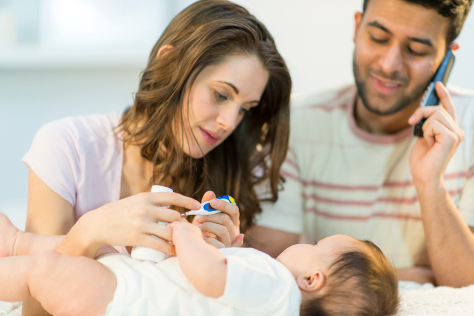What is a fever?
In adults a fever is a body temperature of 38°C or above. In children under five years old a temperature of 37.5°C and over is considered a fever. A fever is normally a sign of an infection or inflammation.
Fever is common in children because the mechanism in the brain that regulates body temperature isn't fully developed. If a fever doesn't respond to treatment or persists for longer than a couple of days, you should see the doctor. You should also call the doctor if:
- your child is very drowsy, floppy or unresponsive
- their temperature is above 38.5°C or 38°C in a child under five years old
- you notice a rash developing
- she has difficulty breathing
- Or has any other symptoms which you are worried about. Trust your instincts as you know your child best

What are the symptoms of Fever?
In children signs of a fever can include feeling tired; having a paler complexion than usual; be generally under the weather; complaining of a headache or other aches and pains; loss of appetite; irritability. Her face may feel hot and flushed. Fever may sometimes also cause febrile convulsions (fits), which are alarming to witness but not usually serious.
What are the treatments and remedies of Fever?
The treatment is the same for adults and children. First remove outer clothing to allow the body to cool itself down. If it's your baby who has a fever, she'll be fine in just her nappy or nappy and thin vest. If you are breastfeeding, offer plenty of breastfeeds to avoid dehydration. If you are formula feeding offer extra drinks of cooled boiled water. In older children and adults drinking regularly will help replace fluids lost through sweating which will help to prevent dehydration. If a fever doesn't respond to these measures, you should start giving paracetamol or ibuprofen. Make sure you're using the appropriate medicines for your child's age group. You shouldn't give paracetamol or ibuprofen to babies under three months old unless it's on your doctor's advice. Although some are licensed for one dose at two months to treat fever after immunisation if necessary. If you're treating an adult, you can give paracetamol and ibuprofen alternately, with a couple of hours between doses, but don't exceed the doses on the packaging. Tepid sponging is no longer recommended as a way of bringing down a high temperature as there is no clinical evidnce that it works, and might make the child feel uncomfortable.
This guide
The information in this Bounty A-Z of Family Health is not a substitute for an examination, diagnosis or treatment by a doctor, midwife, health visitor or any other qualified health professional. If in doubt, always speak to a doctor.
Bounty will not be held responsible or liable for any injury, loss, damage, or illness, however this occurs or appears, after using the information given on this website and in particular the A-Z of Family Health.
Further help
For health advice and information 24 hours a day, 365 days a year, the NHS offers call and web services. You can also visit NHS websites for services, health information and health news at nhs.uk
- England – call 111 from any landline or mobile phone free of charge, or visit nhs.uk
- Scotland – call 111 from any landline or mobile phone free of charge, or visit nhs24.com
- Wales – call 0845 4647 , or visit nhsdirect.wales.nhs.uk
- Northern Ireland – visit hscni.net